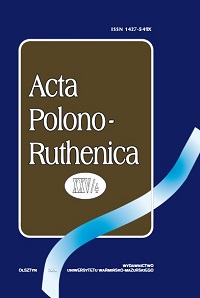Rosja i Słowiańszczyzna w oglądzie Wacława Aleksandra Macie-jowskiego (do połowy lat 40. XIX wieku)
Russia and Slavs in the View of Wacław Aleksander Maciejowski (until the 1840s)
Author(s): Piotr KoprowskiSubject(s): Language and Literature Studies, Geography, Regional studies, Studies of Literature, Philology
Published by: Wydawnictwo Uniwersytetu Warmińsko-Mazurskiego w Olsztynie
Keywords: Russia;Slavic; Poland; Slavs; Slavophile
Summary/Abstract: Wacław Aleksander Maciejowski (1792–1883) was an important figure in nineteenth-century Polish and European scientific and intellectual life. He was a legal historian and representative of the historical school of jurisprudence founded by German scholars Karl Friedrich Eichhorn and Friedrich Carl von Savigny. He preferred the study of the legal history system and closely related cultural history and completed about 240 works and articles in the field of Slavic studies. The theses and opinions contained in Maciejowski’s Slavic works evoked a significant reaction in the Slavic world. This article introduces the scholar’s views on old Russia and Slavs contained in his most important works created in the mid-1840s. Maciejowski had a certain sympathy for Russia and admiration for its achievements. It is worth emphasizing, however, that a similar attitude can be seen in the scholar’s approach to Slavs in general. He was in favour of cooperation between the Slavic peoples. He noticed the implementation of the cultural idea of “Slavic reciprocity” in direct contacts between the Slavs – representatives of science and culture. He had extensive scientific and social contacts with scholars and writers. In Russia, his intellectual debaters and friends included Michaił Pogodin, Piotr Kiriejewski and Stiepan Shevryriov. In this period, Maciejowski, as a Russophilizing Slavophile, came under criticism from Poles, although in Russia his works, scientific predispositions and the fact that, as Shevryriov emphasized, “he works with self-denial and serves a noble Slavic cause” were very positively assessed. The great popularity of this Polish scholar in Russia resulted from the publication of his complete works and not merely fragments that could be used for short-term purposes. Above all, the more universal values of Maciejowski’sworks were noted: the accent on the Slavic element (History of Slavic Legislation) and the fact that the primacy of the Russian element in the Slavic world was emphasized (mainly in Memoirs of History, Literature and Legislation of the Slavs).
Journal: Acta Polono-Ruthenica
- Issue Year: 4/2020
- Issue No: XXV
- Page Range: 71-86
- Page Count: 16
- Language: Polish

